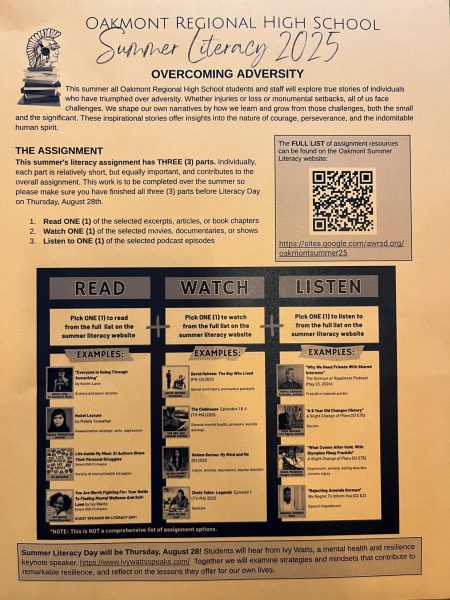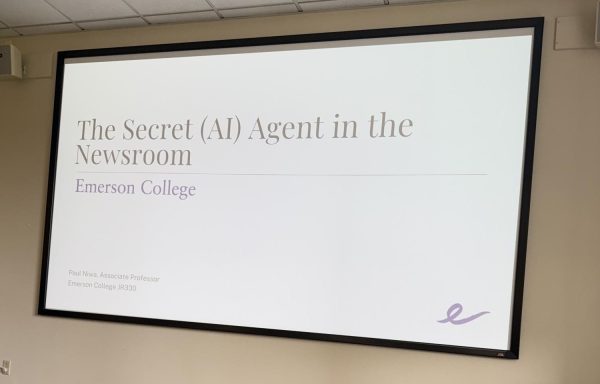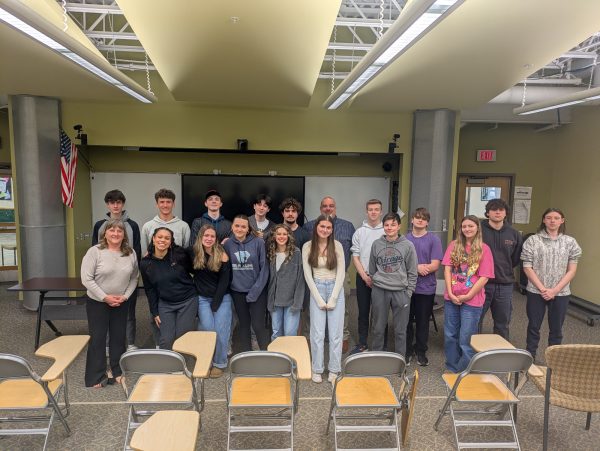Cracking Down on Phones wins Silver Key
Oakmont: One of many schools cracking down on phones
By McKinley Chabot
CONGRATS TO McKinley for this Award Winning Article
With educational concerns of student distraction and emotional stress due to increased screen time, schools all over the country are adopting cell phone policies. Many students are now forced to lock their phone away the entire day, whether it’s in their school bag, a caddy, or a locker. If a student is caught with a cell phone laying around, that student will face consequences. Oakmont Regional High School is no exception to this.
Before the year started, Oakmont’s administrators felt there needed to be a change. They decided that there should be no more glances at SnapChat or Tik Tok, no more looking for answers on the internet, and no more distractions in general.
“Last year, many staff reported consistent issues with students’ phone use, being constantly distracted etc. The staff had discussions about the best way to address these issues,” Principal Jeffery Lizotte of Oakmont expressed.
Together, staff members discussed and decided to bring back a more vigilant school-wide cell phone policy. Initiatives like this had been in existence before – both here at Oakmont and around the nation. During COVID, however, so many procedures softened, including this one.
But now, students are expected to plop their device into an assigned caddy before class begins or keep them entirely out of sight. Students are not allowed to get up and grab their phone at any time, unless a teacher specifically allows the usage for an academic purpose, or a student has indicated an important reason. Generally, it won’t be until the end of class when kids can retrieve their device.
In some classrooms, teachers do not make putting phones in the caddies mandatory, but they must be put away and out of sight for the entire class period. Again, if they are seen out, the required consequences will be faced.
This may seem like a lot to a few students, but it’s actually considered ‘less rigid’ compared to some other schools. According to the Boston Globe, Springfield Central High School has an even stricter policy. Students are expected to, “shut down their phones upon arrival to school and place them into an individual pouch with a magnetic lock that can only be opened by teachers or administrators at the end of the day.” High schools in Greenfield and Chicopee have also adopted this policy.
These schools are not alone with having policies either. An article about Dartmouth High School on nbcboston.com explained their cell phone policy. According to this piece, students must put their phones in a “cell hotel” with numbered pockets on the way into class. They are able to take their phones back when class time is over. What’s interesting about this policy though, is that teachers are also expected to do this.
Not only public schools, but boarding schools in the area are also banning phones. The Buxton school in Williamstown does not allow cell phones on campus. This rule also applies to teachers too.
Other states have cell phone policies as well. In Greece, New York, the Greece Odyssey Academy implemented a cell phone policy that uses the YONDR pouch. According to an article on spectrumnews.com; “It’s called the YONDR pouch, which students keep on their person after locking their cellphones inside at the beginning of the school day. At the end of the day, magnets posted at the door can be used to unseal them.”

(Credit to the New York Times)
In 2019, California became the first state to pass a law that encouraged school districts to ban or limit students’ cellphone use in school. The law was not intended to force bans of cellphones, but instead it hoped that schools would realize the mental health effects of phones on students and take it upon themselves to regulate them. And not only are phones ‘thought of’ as affecting mental health in teens, it’s a proven fact.
According to the Child Mind Institute, “Eighth graders who spend 10 or more hours a week on social media are 56% more likely to report being unhappy than those who spend less time.” The jump in social media contributed to an overall jump in depression symptoms too. Boys’ depression increased by 21% between 2012 and 2015, while girls’ depression increased by 50% in that time period.
Not only do cell phones make teens unhappy, they also mess with their sleep. The Child Mind Institute also stated that “Teens who spent three or more hours a day on electronic devices were 28% more likely to get less than seven hours of sleep, and teens who visited social media sites every day were 19% more likely not to get adequate sleep.”
“I also know that many students are legitimately addicted to their phones and many don’t even realize the extent of their addiction,” Principal Lizotte added.
Leanne Roy, a fitness and wellness teacher at Oakmont and the Varsity Field Hockey Head Coach, says that, since the phone policy has been implemented, the relaxation exercises she has done with her classes have been more of a success. “Before, when doing relaxation or wellness activities, people would reach for their phones or make sure they had them. There was no relaxation going on. Now, I’ve had kids fall asleep during the activities.”
Many Oakmont students also seem to understand the negative mental health effects a phone can have. They might not be the happiest about the new phone policy, but most realize that it may be beneficial for their learning. Paige Humphrey, a junior, says; “I feel like we rely on our phones too much.”
Ava Bjorkman believes that social media makes people seek validation. “I admittedly find myself constantly looking to see if people liked my post after I posted.”
Some student leaders of the school support the policy as well. Cooper Carignan, the Junior Class President, says that his phone has always been away during class, even before the policy, because he knows it will help him learn better. “It hasn’t necessarily affected me, my understanding is generally when the teacher is talking you should be paying attention. I would love to be on my phone all day, yet reality says we need to learn and I agree. As long as we, as students, are to follow the rules and pay attention teachers will have no issues.”
Teachers all over the country, including those at Oakmont, agree with the need for a phone policy. According to CBS News; “99% of teachers support restrictions on cellphone use, and over half are aware that kids are using their phones during class.”
Daniel Dufour, a veteran science teacher at Oakmont and the Student Council Advisor, says that since the new phone policy was put in place, he has seen incredibly good changes. “Everyone seems less on edge. Everyone seems less distracted and more conversations are being had. Students are actually talking and laughing instead of being nose deep in a TikTok. And, I have spent a total of 5 minutes since the start of school telling kids to put their phones away, whereas last year I spent about 20 minutes each block doing that.”
Mrs. Roy also said that she’s been experiencing good changes in students. “I think it’s great. I think it’s a great way to get back from the pandemic and having to wear masks. People have been more engaged.”
She also explains that students were not as angry about the policy as she initially thought they were going to be. “I’ve received very little backlash, which is surprising to me. So far, I’ve only had to take one phone and the student was very respectful and understanding.”
Dufour also believes that, in the end, this is a school, and phones do not have a role in the learning taking place at school. “Students are here to learn, teachers are here to teach. Cell phones, in my opinion, do not supersede that mandate. Of course, students will be upset, we are taking away their direct line to social media, games, and browsing the internet. However, our goal in school is not to play on phones, it is to get an education so we can get jobs and careers that make our culture and planet a better place.”
Some students and parents, however, have concerns about implementing these policies in school. They worry about safety, which is understandable with the crazy world that we live in. They also wonder about what would happen in the situation of a school-wide crisis.
Max Rameau, Westminster Police Officer and Ash/West SRO, understands the perspective of people wanting their phones in an extreme school crisis situation, but has a logical answer: If the school is dealing with a crisis, there are practiced protocols and tools in place for immediate support. The large worry with students having their phones during an active crisis is the immediate spread of misinformation. Referencing a recent local school as an example, Rameau explained that this can interfere or exaggerate the true scope and details of the situation and cause more harm than help.
Countless schools also explain how there is a landline phone in every classroom for emergencies. Front offices also have phones if a parent needs to reach their child. According to CPR News, which did an article on Mountain Middle School’s phone policy in Durango, Colorado; “If parents have an emergency and need to reach their children, they can call the front office and every classroom has a phone.” The same goes for Oakmont High School.
Leanne Roy, who is also a parent in the Ashburnham-Westminster Regional School District, says that she has no concerns whatsoever about the policy and its safety. “I’m happy that my kids cannot use their phones in school, because I know when they get out of school or get home, the first thing they do is go on them. I have no concerns.”
One of the most talked about frustrations with Oakmont’s policy is that students will no longer be able to listen to music while doing work. Many say that, rather than distracting them, music actually helps them focus, retain information, and be more productive overall. An article from Florida National University supported this thought. “The University of Maryland Medical Center reveals that students should ‘listen to music. Music is an effective stress reducer in both healthy individuals and people with health problems.’”
Lex Deloge, a sophomore at Oakmont, feels strongly about the benefits of listening to music while learning. “Personally, I can’t handle the silence. I’m the type of person who always likes some noise, like even when I go to bed I have a fan on in the background.”
Deloge also said that, sometimes, they find themself sneaking their earbuds in during independent work time. “I hate it now because I know that it’s wrong, but I get my work done better with music in. I don’t want to get in trouble for doing something that will help me.”
Despite their bias towards listening to music, Deloge also understands that there is a time and place to be doing so. “Obviously, when the teacher is talking, you have to be respectful and responsible.”
This question is a tricky one too. Sometimes, classes are not necessarily based on the idea of a teacher in front of the board talking. For Lex, Video Game Design is an individually-based class they take. Most of the work is independent, so they miss being able to listen to music then. “Art is also a hard one. I used to listen to music or watch shows while doing my work, but I can’t anymore.”
Of course, not every student is this respectful and responsible, and that question constantly arises. If students are given the opportunity to listen to music while doing independent work, how many will actually get their work done? Unfortunately, many would be sneaking phone glances at social media and be distracted. In that case, it may seem that the pros of students not having their phones outweigh the cons.
However, an alternative does exist – if ok with the teacher. Though it may not be as convenient, students can stream music through their chromebooks. Of course, this would only be allowed during independent work time, and is still the teacher’s call.
Professional research on listening to music is not all positive either. Though some studies have shown that listening to music does in fact help a student get their work done, others have revealed otherwise.
An article on edutopia.org shows this, citing work done by Dr. Nick Perham, a lecturer in the School of Health Sciences at the University of Wales Institute, Cardiff. His studies have shown that listening to music can actually decrease focus and memory. Perham’s 2010 study, Can preference for background music mediate the irrelevant sound effect? shows how music can interfere with short-term memory performance. Another portion of the article also states that Perhm found that reading while listening to music, especially music with lyrics, impairs concentration.
Aside from missing their music, many older students feel a previously earned trust has been breached with the new phone policy. Senior Class President Ani Seppelin addresses this. Though she agrees that there should be a phone policy in place, she feels that there should be some exceptions, and teachers should be able to choose to allow phones or not depending on the class they are teaching.
“I understand why the phone policy is in place, however I am in opposition of the phone policy. Personally, as a senior who has spent my past 4 years at Oakmont, I would like to think I have established trust with my teachers, but with the phone policy it’s as if our trust is being taken away. Also at the AP level, phones can be useful for taking photos of classwork and explanations. With the phones away, we aren’t able to do that anymore. I believe that there should be a phone rule in place, however it should be up to the teacher in each classroom to decide depending on each class.”
Other seniors Seppelin interviewed also agreed with her. Abby Mulhall said; “I don’t really understand why it’s so strict because in the future & real world we will be using them.”
Another student who wished to remain anonymous also opposes the policy. “Chromebooks offer the same distractions as phones. No matter what, if students are being distracted by phones they are still being distracted by other things such as chromebooks.”
Mr. Lizotte responded, saying that this is a “valid point, but it is much easier to monitor the chromebooks and easier to see if they are out or not.” He believes that a teacher would have an easier time focusing distracted students if they were on a chromebook rather than if they were trying to sneak a small phone around.
One senior who chose to remain anonymous thinks that students should, at least, be able to have their phones in their bags for emergencies. “For example, my doctor called the other day and my teacher wouldn’t let me take that important phone call.”
Helen Yan, a senior who is heavily involved in numerous clubs at the school, feels that every student should not have to suffer for the actions of some. “Students who are deemed trustworthy shouldn’t have to suffer from those who only use their phone for fun at school.”
This is an interesting point. Yes, it is true that many students would actually only use their phones for academic purposes, but then another conflict comes up; what makes a student trustworthy? How do you deem a student trustworthy? And how do you separate rules for the trustworthy and the untrustworthy?
Principal Lizotte had responses to all of these questions. “We also believe many are capable of being “trusted” but it is not about trust, it is about taking the distraction away so the focus can remain on academics and the people in front of you in the moment. As far as using phones for taking photos, etc. Teachers still have discretion to allow this as long as it has an academic purpose.” He also explained how, if there is an emergency, then parents can call the front office and they will notify the student within the minute.
Most likely, the debate of phones in school will continue to go on. There will always be some opposers and sound counterarguments, but at Oakmont Regional High School, the policy seems to be enduring. Administrators feel they have enough evidence to back their rule, from more focused students to the negative mental health effects phones create.
As usual, the main goal is to put the students first, and by implementing this policy, the school believes they are doing just that. In the words of Principal Lizotte, “We can no longer be blind to the significant issues that prolonged, unmonitored cell phone use is causing to our society and school communities.”

McKinley Chabot is a member of the Class of 2024, and is serving as an editor for The Oakmonitor this year. She has been involved with the paper for four...











